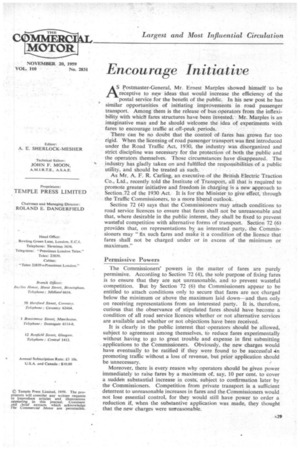No. 2831 En Initiative
Page 31

If you've noticed an error in this article please click here to report it so we can fix it.
a
ASPostmaster-General, Mr. Ernest Marples showed himself to be receptive to new ideas that would increase the efficiency of the postal service for the benefit of the public. In his new post he has similar opportunities of initiating improvements in road passenger transport. Among them is the release of bus operators from the inflexi bility with whic17 fares structures have been invested. Mr. Marples is an imaginative man and he should welcome the idea of experiments with fares to encourage traffic at off-peak periods.
There can be no doubt that the control of fares has grown far too rigid. When the licensing of road passenger transport was first introduced under the Road Traffic Act, 1930, the industry was disorganized and strict discipline was necessary for the protection of both the public and the operators themselves. Those circumstances -have disappeared. The 4, industry has gladly taken on and fulfilled the responsibilities of a public utility, and should be treated as such. .
As Mr. A. F. R. Carling, an executive of the British Electric Traction Co., Ltd., recently told the Institute of Transport, all that is required to promote greater initiative and freedom in charging is a new approach to Section.72 of the 1930 Act. It is for the Minister to give effect, through the Traffic Commissioners, to a more liberal outlook, Section 72 (4) says that the Commissioners may attach conditions to road service licences to ensure that fares shall not be unreasonable and that, where desirable in the public interest, they shall be fixed to prevent wasteful competition with alternative forms of transport. Section 72 (6) provides that, on representations by an interested party, the Commissioners may "fix such fares and make it a condition of the licence that fares shall not be charged under or in excess of the minimum or maximum."
Permissive Powers
The Commissioners' powers in the matter of fares are purely permissive. According to Section 72 (4), the sole purpose of fixing fares is to ensure that they are not unreasonable, and to prevent wasteful competition. But by Section 72 (6) the Commissioners appear to be entitled to attach conditions only to secure that fares are not charged below the minimum or above the maximum laid down—and then. only on receiving representations from an interested party. It is, therefore, curious that the observance of stipulated fares should have become a condition of all road service licences whether or not alternative services are available and whether or not objections have been received.
It is clearly in the public interest that -operators should be allowed, subject to agreement among themselves, to reduce fares experimentally without having to go to great trouble and expense in first submitting . applications to the Commissioners. Obviously, the new charges would have eventually to be ratified if they were found to be successful in promoting traffic without a loss of revenue, but prior application should be unnecessary.
Moreover, there is every reason why operators should be given power immediately to raise fares by a maximum of, say, 10 per cent, to cover a sudden substantial increase in costs, subject to confirmation later by the Commissioners. Competition from private transport is a sufficient deterrent to unreasonable increases in fares and the Commissioners would not lose essential control, for they would still have power to order a reduction if, when the substantive application was made, they thought that the new charges were urrreasonable.




































































































